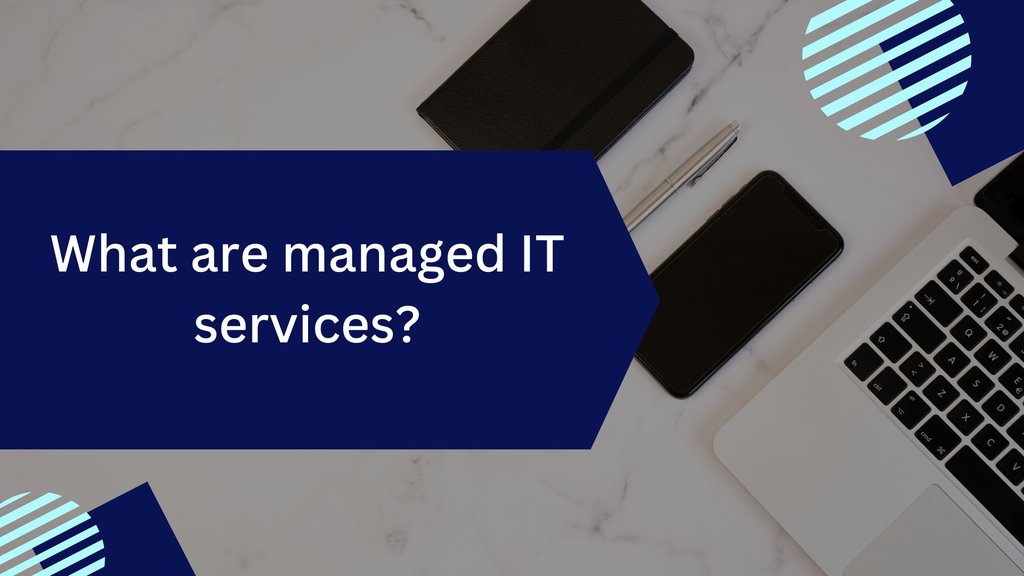
What are managed IT services
Do the growing IT demands of your firm make you feel like you have too much on your plate? Many companies today face challenges in keeping up with the rapid pace of technological advancement, the rise of security threats, and the complexity of IT systems. This is because of the fact that managed it service can completely change the dynamics of the industry by providing an all-encompassing solution to streamline your IT activities and manage your resources efficiently to focus on the core business.
Managed IT Services
Managed IT services are defined as the practice of allocating certain IT responsibilities to a third party. These services may involve managing and implementing cloud and security services or monitoring and caring for the IT infrastructure. The main goal is to provide support and management of the technology resources on a continuous basis with an aim of enhancing efficiency of operations and reducing the burden on internal IT teams.
How Do Managed IT Services Work?
Then what is at work here? Most often, it is the reverse.
In most cases engaging a managed IT services provider (MSP) is quite an easy task:
- Assessment & Needs Analysis: This is where you will work with your MSP to better understand your unique requirements, assess your existing IT setup, and recommend the appropriate managed services solution.
- Service Level Agreement (SLA): A comprehensive SLA will be generated containing information on the specific services to be carried out, quality of service levels, delivery timelines, and other critical information.
- Implementation & Integration: The purpose of this is to prevent any disruption in the delivery of services. The MSP will meld their managed services into your pre-existing IT structure.
- Remote Monitoring and Management: The MSP will utilize advanced remote monitoring tools to oversee your IT systems and to prevent or resolve any potential issues quickly.
- Proactive Support and Maintenance: MSP will provide all the necessary support and maintenance continuously to ensure that the IT systems are functioning optimally and secured appropriately.
Some of the critical aspects of managed IT services include:
- Remote Monitoring: Using advanced tools, Managed Service Providers (MSPs) can effectively monitor the performance of an organization’s IT infrastructure to eliminate any signs of trouble or decline.
- Proactive Problem Solving: MSPs cope well with the problems of operational downtime by spotting a problem in its early stages and rectifying it before it escalates and interferes with operations.
- 24/7 Support: Most MSPs offer a support service that is available 24 hours a day to ensure that all managed IT systems are functional and available at all times.
- Security Management: MSPs can implement advanced security measures to protect your information and networks from cyber threats.
- Compliance and Regulatory Adherence: Leverage the MSP’s knowledge and experience in facilitating compliance with laws and practices applicable to the sector.
Transform Your Wi-Fi Experience!
Experience the future of wireless communication with Anticlockwise’s Managed WiFi service.
Benefits of Managed IT Services
Cost Savings
Say goodbye to high IT overhead costs. Managed service providers implement fixed rate pricing and provide bundles of services because of the economies of scale, reducing the need to incur capital costs on new technology and eliminating the need for expensive internal IT personnel.
Take, for example, a small business that has relied on one IT technician whose responsibilities included implementing software updates, maintaining the network, and responding to occasional data breaches — sometimes all at once. For less than the cost of a dedicated IT team, managed services provided proactive security solutions, 24/7 monitoring, and on-call support assistance.
Improved Efficiency
Managed service providers can enhance the efficiency of IT operations. They allow your own IT personnel to focus on those projects that drive the growth of the business while ensuring that your systems are running optimally in the background.
Then imagine an e-commerce business that is doing well. Previously, their personnel would devote endless hours resolving user issues and pinpointing network glitches. By outsourcing the help desk and technical support services, the internal IT team was able to focus on developing a mobile application that improved customer experience and generated more revenue for the business.
Enhanced Security
Cybercrime is here to stay. With intrusion detection, firewalls, data encryption and other advanced security solutions offered by managed service providers. Furthermore, they also update with the latest developments in cyberthreats ensuring that your systems remain fully protected.
For example, a local law firm was brought to its knees after a ransomware attack. These professionals were unable to resolve issues relating to their data restoration due to an absence of in-house security expertise. Managed services which provided full security solutions and a rapid response team enabled the firm to restore its systems swiftly and securely.
Scalability and Flexibility
The provision of managed services is designed to adapt in order to satisfy your evolving business needs. Whether your organization is on an upward or downward trajectory, it is possible to easily extend or reduce your service package in order to ensure that you have just the right level of IT support available at all times.
Consider a growing agency for marketing. In the beginning, they had basic IT needs but as they developed, their reliance on the cloud for storage and cloud-based applications, increased. As the number of employees grew, the managed services also increased the user support and cloud management services provided, giving them an ideal solution that could grow with them.
Types of Managed IT Services
Managed Network Services
These services cover troubleshooting, maintenance, and network monitoring. Businesses may guarantee peak performance and minimize downtime by outsourcing network management.
Managed Security Services
Focusing on information security, these services help protect the organization’s digital assets, for example, by using intrusion detection systems and by keeping a watch on firewalls. In today’s technological age, these measures are essential in combating the escalating threats posed by cyber criminals.
Managed Cloud Services
This encompasses the management of platforms as a service (PaaS), software as a service (SaaS), and infrastructure as a service (IaaS), respectively. E.g. Cloud strategies engage models that enable businesses to leverage the benefits of the cloud with the protection of internal security and compliance.
Help Desk and Technical Support
In most managed IT services, a full suite of end-user help desk support tends to be offered. This enables quick resolution of technical issues, minimizing disruptions to the course of business.
The landscape of managed IT services is always evolving due to disruptive new advancements of technology, including automation, and artificial intelligence (AI). These changes enhance progressively the managed IT programming solutions' effectiveness, cost, and levels of service.
Managed IT services will continue to be a necessity for businesses of any size as the world becomes more and more connected and reliant on technology. By outsourcing your IT needs you can switch your focus on your primary objectives and leave behind the distractions and hassle of IT management in order to conserve valuable resources.
Ready to change the way you do business with managed IT services? Get in touch with Anticlockwise to find out how our team of specialists will assist you in realising your IT objectives.

Managing Director
